
views
Toilets are essential spaces for human dignity, health, and well-being. However, not everyone feels comfortable or safe using public toilets, especially those who belong to marginalised groups such as transgender people, people with disabilities, and people from lower castes. These groups often face discrimination, harassment, and violence in public toilets, which can have serious consequences for their mental and physical health. Therefore, it is important to create inclusive spaces that respect the diversity and needs of all toilet users.
One of the key factors that can influence the inclusivity of public toilets is the role of toilet attendants. Toilet attendants are the people who manage, clean, and maintain public toilets. They interact with toilet users on a daily basis and have the power to create a positive or negative experience for them. However, many toilet attendants lack the knowledge and skills to deal with diverse toilet users in a respectful and empathetic way. They may have bought into stereotypes, prejudices, or biases that affect their behaviour and attitude towards certain groups of people. They may also be unaware of the specific challenges and needs that these different groups face, when using public toilets.
This is where training and sensitisation programs can play an important role.
The Importance of Training
Training and sensitisation programs are educational interventions that aim to equip toilet attendants with the knowledge and skills they need to create inclusive spaces for all toilet users. They cover topics such as human rights, gender identity and expression, disability awareness, caste discrimination, hygiene and toilet sanitation, communication and customer service, and conflict resolution. They also provide opportunities for toilet attendants to interact with diverse toilet users and learn from their perspectives and experiences.
Basic Hygiene Standards
Training should start with educating toilet attendants on the importance of maintaining hygiene standards. This includes regular cleaning schedules, proper use of cleaning agents, and understanding the importance of a clean environment in preventing the spread of diseases.
Understanding Inclusivity
At first blush, the concept of inclusivity can be slippery for some people. Toilet attendants need to have a bone deep understanding of this concept, so they can better assist users whose needs are different. These can include those with disabilities, the elderly, and members of the LGBTQ+ community. Attendants need to be made aware of the facilities and accommodations required by these groups and should be prepared to offer assistance when necessary.
Communication Skills
Effective communication is paramount. Toilet attendants should know how to interact respectfully with users, addressing them appropriately and avoiding language that might be considered offensive or derogatory. They should also be trained to handle complaints and feedback constructively.
Empathy Towards Diverse Needs
Sensitisation programmes should focus on building empathy. By exposing toilet attendants to the adverse experiences these groups sometimes face, as well as their challenges, we can set the stage for both understanding and respect.
Breaking Stereotypes and Prejudices
It is vital to address any existing stereotypes or prejudices that the attendants may have bought into. Sensitisation helps in breaking down these barriers, enabling attendants to look past gender, race, or disability, and understand the people as the human beings they are.
Handling Sensitive Situations
Toilet attendants should be trained to handle sensitive situations with care and discretion. For example, if a transgender person faces harassment in a toilet, the attendant should know how to intervene respectfully, and if necessary, alert security or management when the situation escalates.
Benefits of Training and Sensitisation Programs
When toilet attendants are properly trained and sensitised, the ripple effect is immense. Training and sensitisation programs can have multiple benefits for everyone: toilet attendants themselves, the toilet users, and society at large:
For toilet attendants, these programs can enhance their professional competence, confidence, and job satisfaction. They can also help them develop a sense of empathy and respect for all toilet users, regardless of their identity or background. This empathy doesn’t limit itself to their workplace alone, and helps them reach out to these individuals from a place of understanding, wherever they encounter them.
For toilet users, they can improve their access to safe, clean, and comfortable toilets that cater to their specific needs and preferences. They can also reduce their risk of facing discrimination, harassment, or violence in public toilets. Knowing that they have an ally in there, gives users confidence, even if they are in unfamiliar surroundings.
For society at large, they can promote social inclusion, cohesion, and harmony by fostering a culture of tolerance and acceptance among different groups of people. When these attendants talk to people who are biassed, phobic or just plain misinformed, they are able to have a more nuanced conversation and help these people overcome their biases and phobias. That is the work of an ally.
Not only does the immediate environment of the restroom improve, but the attitudes and behaviours of the attendants can also influence the users. A restroom managed by an attendant who exudes respect, empathy, and understanding sets an example for users, who may carry these values with them into the wider community.
Case Study: Harpic and News18’s Initiative for Inclusive Toilets
One of the examples of training and sensitisation programs for toilet attendants is the initiative by Harpic. Harpic, India’s leading brand in the lavatory care segment, has worked on several initiatives that are adjacent to the GoI’s Swachh Bharat Mission – for instance, the establishment of Harpic World Toilet Colleges. Harpic has also taken the lead in designing campaigns and initiatives that not only focus on toilet sanitation but also inclusivity.
Harpic has also partnered with News18 on Mission Swachhta aur Paani – an initiative that transcends the concept of cleanliness alone. It is a movement that recognizes the profound significance of toilets, viewing them not merely as functional spaces but as beacons of safety and acceptance for the marginalised. This exceptional mission is built upon the firm belief that clean and inclusive toilets are vital for fostering a society that embraces and empowers us all, unconditionally.
Mission Swachhta aur Paani provides a great platform by bringing together celebrities, policy makers, doctors, activists, NGOs and key govt stakeholders together on issues that need cohesive action from all these stakeholders together. By turning their attention to the issue of gender inclusivity in toilets, Harpic and News18’s Mission Swachhta aur Paani is creating a compendium of knowledge articles, videos and other materials that are helping build an appreciation for the challenges that the intersex, transgender and non-binary community go through, just to go to the toilet.
Conclusion:
Creating inclusive spaces is a shared responsibility that involves understanding, respect, and empathy. By investing in comprehensive training and sensitisation programmes for toilet attendants, we are taking a significant step towards ensuring that public toilets are welcoming and respectful environments for all. The impact of such programmes extends beyond the walls of the toilet; it contributes to the larger goal of fostering a more inclusive and understanding society.
To know more about how you can play a part in this national conversation, join us here.




















Comments
0 comment